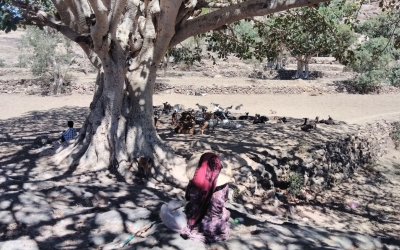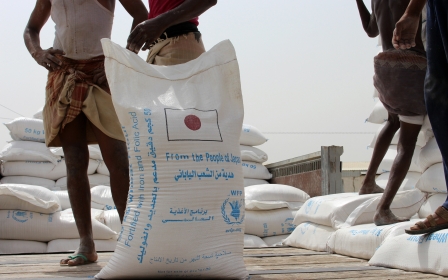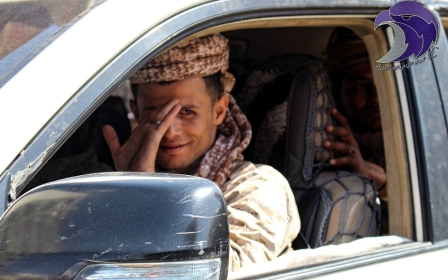'We only found her bag': Abductions of women and girls spreads fear in Sanaa

Like any other Wednesday, on 6 March 12-year-old Ghadir al-Asri left her house in the Asir neighbourhood of Sanaa to go to school. But this time she never returned.
Unknown and unseen abductors snatched her while she was walking alone behind her friends, Ghadir's father Mohammed al-Asri told Middle East Eye.
'I feel lost after my daughter's abduction'
- Mohammed al-Asri, father of missing 12-year-old
"Less than an hour after the abduction, we knew the painful fact and we looked for her everywhere in the surrounding areas, but unfortunately we did not find her," he said.
“We only found her bag and jacket on the route between the school and the house, and we still do not know where she is.”
Terrifyingly, her abduction is part of a trend. Ghadir's case is only one of more than 100 abductions of women and girls in and around the Yemeni capital in recent months.
New MEE newsletter: Jerusalem Dispatch
Sign up to get the latest insights and analysis on Israel-Palestine, alongside Turkey Unpacked and other MEE newsletters
However, few people dare to talk about the issue in Houthi-controlled areas like Sanaa, and many female abductees' relatives feel ashamed of discussing their cases.
Ghadir is more open than most, saying he does not have any disputes with anyone so he has no idea who could have taken his daughter.
"We do not have any information about the abductors and the reasons behind it, and I cannot accuse anyone," he said.
"We are still looking for her and we informed the police station, and we hope to find her. I feel lost after my daughter's abduction."
Ransom demands
Last month, Sanaa-based NGO the Yemen Organisation for Combating Human Trafficking (YOCHT) accused the Houthi rebels who hold the capital of abducting women and girls to force their relatives to pay ransoms.
Nabil Fadhel, the head of the organisation, told MEE: "Some Houthis abduct the women and girls and take them to their homes, then demand money from their relatives to release them."
According to Fadhel, Yemen's conservative society encourages the kidnapped's relatives to pay whatever ransom covertly, and avoid making the abductions public.
"I have spoken with some victims whose relatives were forced to pay money, but they do not want to talk about the truth as they consider it to be a societal shame," he said.
A lawyer familiar with the cases, who preferred to remain anonymous, told MEE that kidnappers threaten to spread rumours that the abducted women are sex workers, encouraging their families to keep silent and avoid social stigma.
In the lawyer's view, this indicated that Houthi officials are behind the disappearances, as they would have the ability to tarnish reputations more easily.
Fadhel's organisation estimates that around 120 women and girls have been abducted in recent months in Sanaa. Many are thought to have been later released, though Fadhel was unsure of the number.
Yemen's government has also accused the Houthis of being behind them.
In a statement, the Yemeni government's defence ministry laid the blame at the Houthis' door, as well as implying that United Nations officials were responsible, without providing any evidence.
State of fear
Just a couple of weeks after Ghadir's abduction, a state of fear still envelops Asir, especially among her classmates who believe they could be the next victims of the anonymous gangs.
Mohammed, an Asir resident, told MEE that people cannot be comfortable until they find Ghadir and know the reason behind the abduction.
'Now parents accompany their children to school in the morning and bring them back at noon, as it is not safe anymore to let your child leave the house alone'
- Mohammed, Asir resident
"It is normal that people are scared when they hear about the abduction of children by unknown people, so we hope that security forces arrest the abductors and save children everywhere," he said.
"Now parents accompany their children to school in the morning and bring them back at noon, as it is not safe anymore to let your child leave the house alone."
The Houthis deny accusations they are behind the abductions.
And a source in the Houthis' interior ministry in Sanaa, who spoke on condition of anonymity because he was not authorised to speak to the media, told MEE that the reports were exaggerated.
"The numbers of abducted children are exaggerated, [as] the media of the aggressors [the Saudi-led coalition] portrays it as a trend," the source said.
Abductions in Yemen are nothing new, and many men have been kidnapped in both Houthi and government-held territory since 2015. The recent abductions of women and girls, however, are unusual.
So far, the claims against the Houthis are unsubstantiated, and no women have yet spoken publicly about their experience of abduction.
The Houthi source said that kidnapping in Yemen was "normal", but stressed that the attention it has recently received in pro-government media was conversely very unusual.
'Grave abuses'
The Rights Radar foundation, a Netherlands-based organisation which promotes human rights in the Arab world, has called for an urgent investigation into the cases of kidnapping, rape and abuse that many women and girls have been subjected to during the four-year civil war in Yemen.
In a recent report the foundation said: "In the provinces controlled by the Houthi militants, which are the most populated areas, women were more subjected to grave abuses than other provinces during the war.
"Particularly, the anti-Houthi women, as they were subjected to abducting, tracking, physical assault, repression, and forcible disappearance, in which some abuse cases reached to the extent of murder."
The report, which was released on International Women's Day, noted that similar cases were also being reported in the southern city of Aden, allegedly perpetrated by Emirati forces or their allied local militants.
UAE forces and their Yemeni proxies are a major component of a Saudi-led coalition that has fought in Yemen's civil war on behalf of the government since 2015.
In August, the UN published a report detailing abuses perpetrated by Saudi and Emirati forces and their proxies during the war.
Among the reported abuses, such as the recruitment of child soldiers and the creation of torture prisons, were the random kidnappings of women and children who were sexually abused and sold.
'Die or to live in dignity'
On 9 March, dozens of women organised a women's march in Sanaa condemning the abduction of women and children and demanding that pro-Houthi security forces make the capital safer and arrest the gangs that are abducting women and children in broad daylight.
The protesters chanted: "Either to die or to live in dignity."
Khulood, a mother of three children and one of the protesters at the march, told MEE: "The abduction of Ghadir al-Asri and others means the abduction of our freedom, peace and dignity.
"The gangs are threatening all women and children in Sanaa, so we should stand together to fight them."
'The Houthis rule Sanaa and they are responsible for its security, so we demand them as authorities to save us'
- Khulood, protester
Khulood said that the protesters are not accusing anyone in particular of being behind the abductions, but calling on the Houthis to act and end the wave of kidnappings, as they are in control of the city.
"The Houthis rule Sanaa and they are responsible for its security, so we demand them as authorities to save us and arrest the abductors of women and children in Sanaa," she said.
"The abduction of Ghadir was not the first and she will not be the last victim. I believe the abductions will continue until we see the criminals subjected to trial."
The interior ministry source said the Houthi security forces were doing their best to look for Ghadir and the other kidnapped women and girls.
"We are working with the cases of abductions as if they are our women and children, and we hope we will arrest the abductors soon," he said.
This article is available in French on Middle East Eye French edition.
Middle East Eye delivers independent and unrivalled coverage and analysis of the Middle East, North Africa and beyond. To learn more about republishing this content and the associated fees, please fill out this form. More about MEE can be found here.






